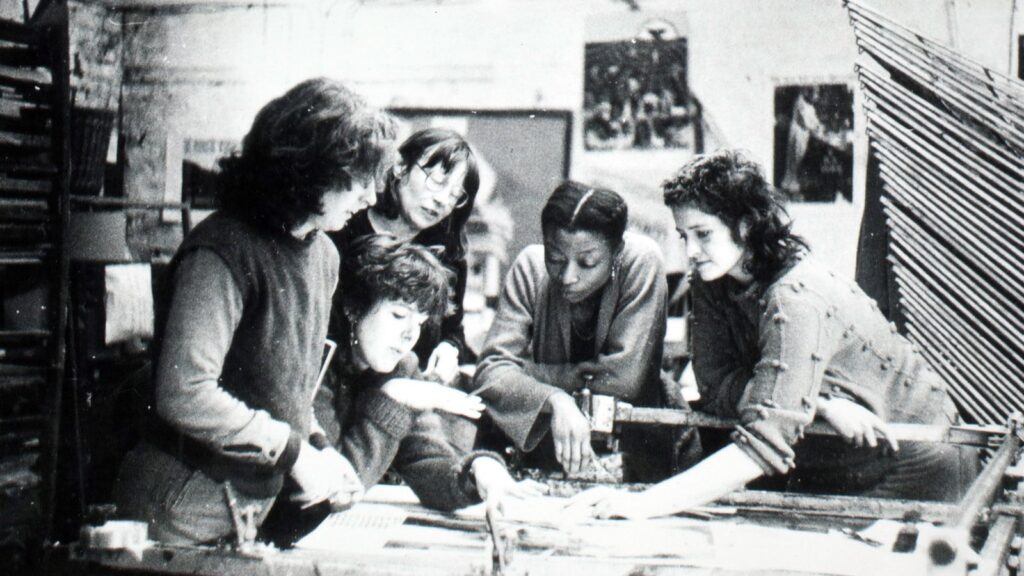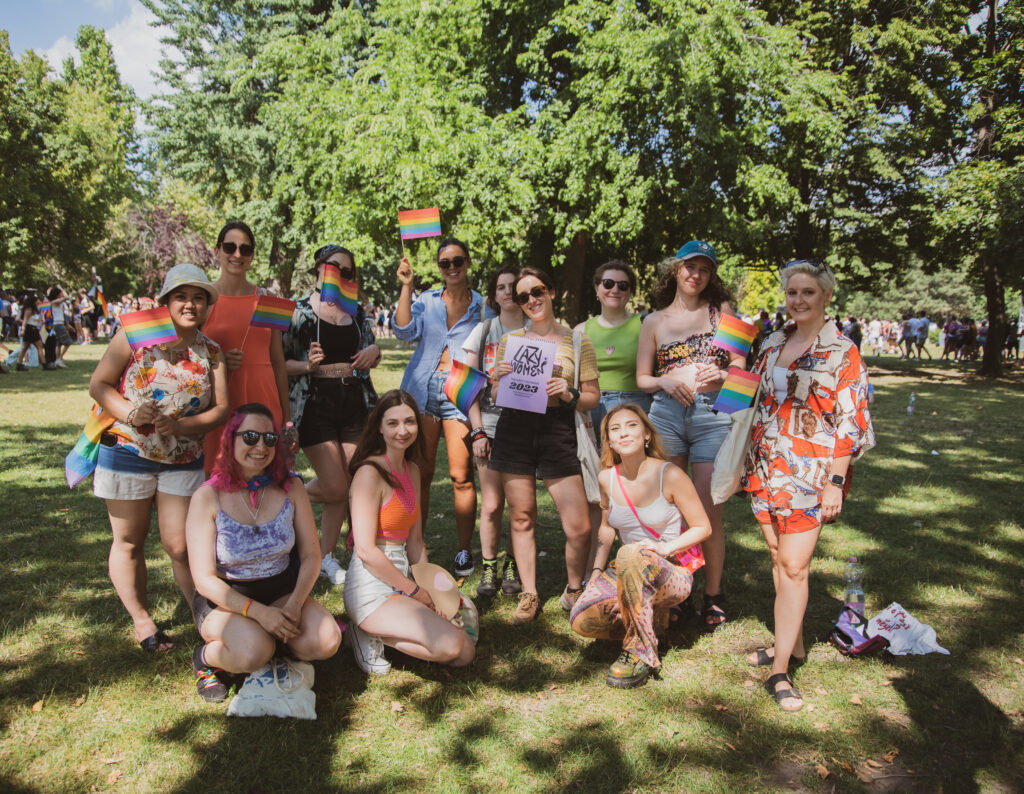What makes an effective women’s group? And what do we even mean by that term? I tend to think of it as a collective focused on supporting and advancing the needs and interests of women to improve current and future circumstances and opportunities.
The lead-up to International Women’s Day always encourages us to reflect on the histories and trends of women’s groups and the feminist movement in a broad sense. For me, these past few months, reflections have been sparked by a couple of interesting reads.
Daring to Hope
The first wave of my ponderings was influenced by Shelia Rowbotham’s Daring to Hope: My Life in the 1970s, “a memoir of motherhood, revolution, and liberation,” as told in a very personal way by a renowned activist – albeit one I (perhaps ashamedly) hadn’t actually heard of. The collection of ‘70s stories stand well on their own, despite this memoir being a follow-up to one detailing tales from the ‘60s, picking up at the meeting of a lover and attending the Women’s Liberation Conference at Ruskin College, Oxford, and closing with conversations around the definition of patriarchy, and how it linked to understandings of capitalism.
Through a decade of anecdotes – which, though rich in important history, I didn’t always find especially compelling from a narrative perspective – I learnt of the practicalities of grassroots movements and how their influence could expand out of local communities and into national consciousness, the cost of printing pamphlets to distribute, or sell, at rallies and conferences, and the innovative ways women found to offer sisterhood, childcare support, and healthcare, in the face of Thatcher’s Britain. All this at a time with no smartphones, no internet, no laptops to bash out a few emails on the sofa while a baby sleeps beside you. This was raw activism. Fighting the good fight, day in, day out, through travelling and talking, writing and walking.

Women’s Liberation Conference, Oxford. Source: Oxford International Women’s Festival.
Activism Evolving
Perhaps inevitably then, I couldn’t help but compare the efforts of Rowbotham, and those who surrounded her, with the efforts of Lazy Women – a truly global, impact-inducing community, which simply could not and would not exist without the powers of the internet.
We – the team who lead activities for the organisation, as well as contributing members and those following online – are based in cities, towns, and villages all over the world, and particularly across different parts of Europe, many in rural locations.
Some are students without the financial means to travel to meet one another; others are mothers without the time or flexibility to do so. And yet, we exist together in this online world. We communicate over Slack. We share ideas via email. We get on a Zoom call to enjoy a yoga class together, or ignite a community conversation around an important topic. Access to internet is what gives us access to each other, access to the content we produce, and ultimately, the messages we are trying to ensure have an impact on the world.
I think of Rowbotham sitting in crowded lecture halls, surrounded by women listening to someone they deem an inspirational speaker share ideas of empowerment, and how groups then branched out and considered what to do with that information. I sometimes worry if we, Lazy Women, are lacking in creating that IRL opportunity for women to listen, connect, and share – although in-person meet-ups are excitingly becoming a greater focus.
But then, I hope that it’s already happening, albeit in a different way. Someone sees an Instagram post. That leads them to an article. The article resonates, and they share it in a group chat with friends. The friends chat about the article over coffee. One later reflects on the conversation during a phone call with their mother, another with their boyfriend over dinner. Perhaps the mother thinks nothing more of it; perhaps the boyfriend mentions something to his sister, who in turn mentions something to her girlfriend. And the conversation continues, sometimes diluting, tangents ever-expanding.
All this from the spark of a scroll on a platform we are often told is bad for our mental health, self-esteem, and attention span – but that is precisely why Lazy Women is there, to offer some positive energy to an audience looking for something that will make them feel good. A thought-provoking read from Lazy Women may not provide an instant dopamine hit (though the fabulous illustrations in every post will inevitably spark joy).
Yet, we’re here for the long game, as women’s groups always have been, and every bit of engagement counts, for scrollers, readers and community members alike.
Of course, we are not alone in this approach. Hundreds, thousands, maybe millions, of online-based groups exist trying to make their impact in this world – many focusing on women’s issues, some trying to counteract those efforts, and others still offering a plethora of community support around endless topics. But the on-the-ground work done by Rowbotham and her contemporaries is still vitally important, too.
The healthcare workers are doing what they can to support Black women through childbirth and early motherhood, offering guidance and advocacy to try and ensure the experience is more positive than statistics suggest it may be. The community organisers gathering friends and colleagues to make posters for a march down to the local government building, asking for safe and affordable housing for women and children, yes, but for men and non-binary folks too. The women’s refuge centres full of welcoming faces and expert tea-makers, able to connect those in need with therapists, financial advisers, and, sometimes most importantly, new friends.
Wild Hope
Not long after finishing Rowbotham’s memoir, I picked up another memoir of sorts, in Marisa Bate’s Wild Hope. In this epic journey of a read, Bate retraces her mother’s footsteps from a trip to the USA in the ‘70s “in search of women’s freedom”. She explores the links between generations of women, in her own family and others’, how stories intertwine, and in doing so, charts the ebbs and flows of the women’s movement in the US, particularly comparing the state of affairs in the ‘70s to the ‘00s and beyond. Similar comparisons may be made between Rowbotham, who did spend some time in the US in that flower power era, and the US-based female leaders and groups championing freedoms that led to the monumental decision in Roe v Wade.
They could never have known the reality we’d be experiencing now, with women’s rights to bodily autonomy being actively stripped back, not only in the States, but in different ways across Europe, and elsewhere across the globe too.
And yet, perhaps we are in a better position than ever to fight back. When the Roe decision was reversed, women in the UK and elsewhere around the world protested the decision in solidarity. The Women’s March that started in 2017 as a backlash to Trump’s presidency spread like wildfire, no doubt through the power of social media, causing more solidarity marches to pop up in Canada, Mexico, and even Antarctica! And while Trump may have been the initial catalyst, that solidarity was linked to everything that his leadership threatened, like environmental reform, disability justice, and equality for all, regardless of race or sexuality.
We know more about our sisters in other countries because the digital world offers more access and insight on a quicker, often real time, basis, encouraging us to show up in the ways we can – virtually or IRL. And the news isn’t all bad – think about Spain introducing menstrual leave, or just this week, France becoming the first country in the world to include the right to abortion in its constitution. Let’s hope this ignites positive legal waves worldwide.
The Power of Podcasting
The latest series of the Lazy Women podcast is another great example of maximising this new age for women’s groups. Co-funded by the European Cultural Foundation’s Display Europe project, the new series explores the experiences of Eastern European women “making it” in Western Europe, investigating what drove their moves across borders, what might take them back, and the realities of trying to assimilate with neighbours who in theory share a similar sense of identity, but in reality hold barriers up towards those who do not hail from within the same parameters of a national map.
Despite having been part of Lazy Women in some way for around four years, I am finding through these episodes that I have so much to learn about women’s experiences in different parts of Europe, as well as about how we define the idea of the West and what that means for women’s freedom.
I hope to take these insights and lessons to think in new ways about how I support consciousness-raising, connection, and impact.
While we may be critiqued, as women especially, for the increased influence the online world has on us, our obsession with smartphones over sit-ins, and the ease of clicking ‘submit’ for an online petition compared to the power of gathering to create change in a local neighbourhood, there are plenty of powerful pockets in the online world that facilitate advocacy, learning, and connection.

Lazy Women in Budapest, 2023. Photo @ Kinga Gárdonyi
Looking Ahead
So, what does make an effective women’s group? I don’t think the answer lies in the kind of work they do or the medium through which they do it. What matters is showing up, in whatever way we can, to create, support, advocate; make a difference, big or small. Demonstrating that we care that we dare to hope for something better for ourselves and others. Being intentional about what we ask for, what we fight for, what we demand.
By daring to hope, all the better if it’s wildly, our fire will be forever fuelled.
Written by Lauren Powell.
Illustrated by Janka Sára Balázs.

